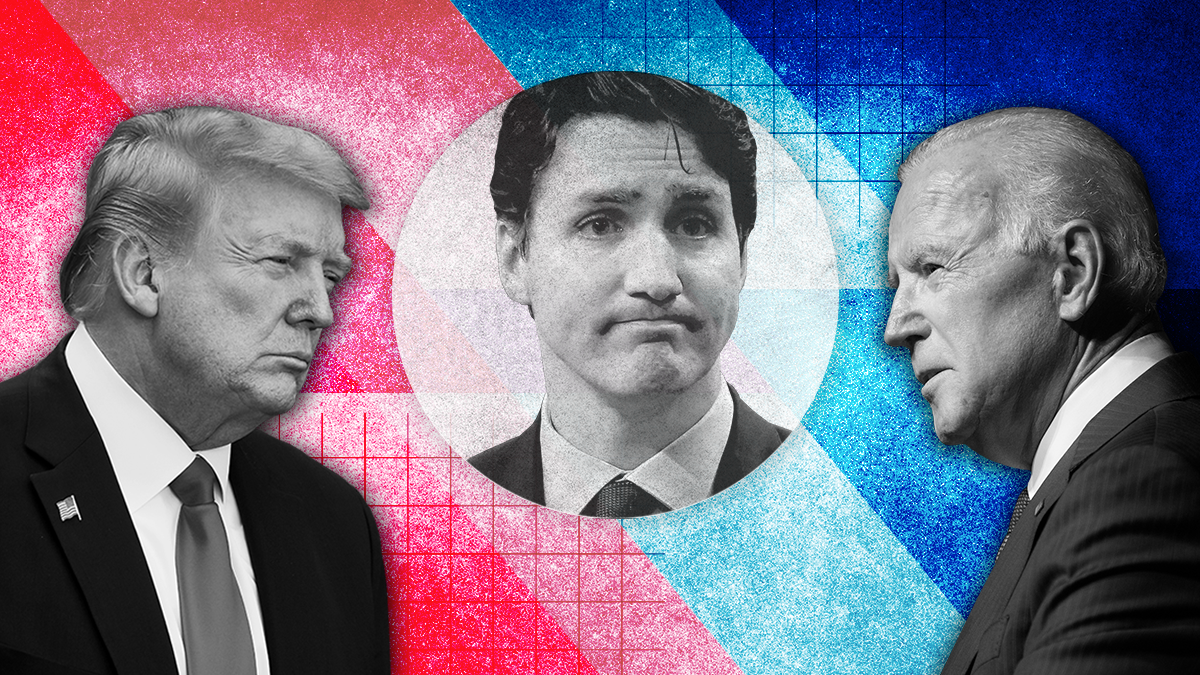“Geography has made us neighbors. History has made us friends. Economics has made us partners, and necessity has made us allies,” John F. Kennedy said in a 1961 speech to Canada’s parliament.
Politicians and columnists like to refer to that quote whenever they consider the warm and enduring relationship between Canada and the United States. But Canadians are watching with a mounting sense of dread as Americans set up a potential rerun of the 2020 election, with Donald Trump, 76, facing off against Joe Biden, 80, for a grudge match that promises to be as distasteful as a punchup at a nursing home.
Until Tuesday, it seemed possible that Biden might decide he would prefer to spend more time with his family, or napping, and let someone in their 70s take over. But, no. He’s in.
And this week, Trump started to look like he has a lock on the GOP nomination. Of course, it is still early. By this time in the 2016 cycle, Trump had not even declared, and the Times’ resident poll interpreter was predicting an easy win for Jeb Bush. Lots can happen before the Republicans meet in Milwaukee next July, but I think we all know the arc of history is bending toward the “rough beast” of Mar-a-Lago.
The first big clue was the reaction of Republican voters to his indictment for allegedly funneling hush money to a porn star, which was apparently just the signal that on-the-fence Republicans were waiting for. The second was the continued failure of Florida Gov. Ron DeSantis to respond effectively to Trump’s putdowns, a familiar pattern from 2016 when Trump ran his hapless rivals through the woodchipper one by one. Desantis is no better at handling the Donald than Sens. Ted Cruz or Marco Rubio and looked weird and rattled when asked about that in Tokyo this week.
So Americans look intent on setting their aging champions against one another again. Canadians can only say good luck, and may the best man win.
But if Canada had a vote, Trump would be out. Canadians prefer Biden by a huge margin, polls show.
PM Justin Trudeau, like most Canadians, will be pulling for Biden. Trudeau doesn’t seem as close to Biden as he was to Barack Obama, but they are progressive allies, and in Ottawa last month he and Biden announced a new border deal that allowed Canada to shut the irregular crossing at Roxham Road. The Inflation Reduction Act remains a worry for northern policymakers, since it may draw jobs and capital south, but in Ottawa, Biden spoke cheerfully about the opportunities for both countries. Trump, in contrast, created huge headaches for Trudeau when he was president with his confrontational approach to trade.
“The last time Trump was elected, it forced Canada to waste three years renegotiating its most important trade agreement,” says vice chairman of Eurasia Group Gerald Butts, who helped Trudeau negotiate that deal as his principal secretary. “And that's just one of many things that cause problems for Canada. In the context of a live shooting match with Russia, the prospect of a Trump presidency is existential for NATO. This ain't dairy policy.”
But could Trump help Trudeau win votes? Since the American election will likely happen before the next Canadian one, there might be an electoral upside for Trudeau. If he can link his Conservative opponent, Pierre Poilievre, to Trump, it could benefit the prime minister at the polls.
But politics isn’t everything.
“Elections are short term, and governments are long,” says Butts. “And it's not good for whoever is the government of Canada if Donald Trump is in the White House.”
It is not just Liberals who fret about Trump, says Janice Stein, founding director of the Munk School of Global Affairs & Public Policy at the University of Toronto.
“He’s a flamethrower. And that’s obvious now to everybody. So even people in Canada who like the message, and there are more than we think, there has to be some hesitation because he’s so erratic.”
Would Trump put the USMCA at risk? Experts say he’s unlikely to rip up the trade deal he negotiated as it would require him to undermine his own work.
“USMCA is up for review in 2025-2026,” says Stein. “I think it’s unlikely that he would tear it up a second time. And the Inflation Reduction Act is more protectionist than what Trump did.”
But that doesn’t mean the two men would get along. Christopher Sands, director of the Wilson Center's Canada Institute, imagines it would be a difficult relationship and one defined by “a cascade of negative vibrations.”
If things get too heated, it is even possible Trump could turn on Trudeau. “Trump would have no reason not to make him a foil and just say, ‘Well, yeah, look at Justin Trudeau. He thinks he's so smart. But what he did was he tried to pick our pockets, and we're gonna show him. We're gonna get rid of the USMCA, and we're gonna do this and do that,’” says Sands.
Whatever might happen between Trudeau and Trump, there are powerful forces in both countries that would act to protect the vital trade relationship. The US is Canada’s best customer, and vice versa. If that is threatened, business and labor would put pressure on governments to sort it out, no matter who is running either country.
Kennedy said our countries are friends, which makes us all feel good, but Henry Kissinger was likely closer to the truth when he said that “America has no permanent friends or enemies, only interests.”
The good news for Canada is that it is in America’s interest to get on with its neighbor.






